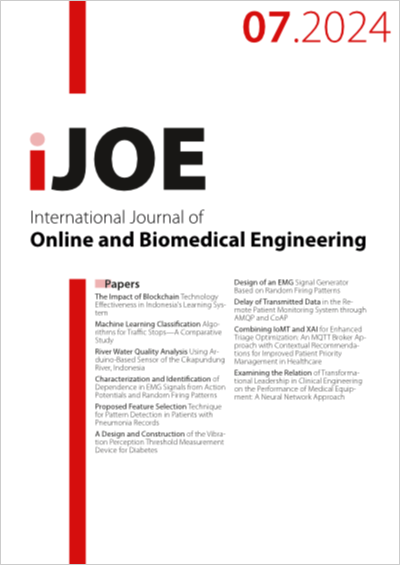Combining IoMT and XAI for Enhanced Triage Optimization: An MQTT Broker Approach with Contextual Recommendations for Improved Patient Priority Management in Healthcare
DOI:
https://doi.org/10.3991/ijoe.v20i07.47483Keywords:
Artificial Intelligence, IoMT, Explainable AI (XAI), emergency department, Contextual Recommender System, MQTT BrokerAbstract
The widespread adoption of the Internet of Things has significantly enhanced our daily lives across various dimensions. E-health has significantly benefited from advancements in the Internet of Things (IoT), particularly with the emergence of the Internet of Medical Things (IoMT). A sophisticated wireless sensor network produces a huge amount of data, requiring robust cloud-based hardware for precise processing and categorization. The IoMT allows for the extensive gathering of medical data from incoming hospital patients, enabling real-time monitoring of vital signs and health statuses. Nevertheless, effectively prioritizing patients in emergencies is challenging due to the importance and complicatedness of the data. To tackle this issue, an innovative solution involves integrating Explainable Artificial Intelligence into the IoMT ecosystem. By incorporating Explainable AI, the system enhances explainability, fostering trust and reliability in patient prioritization. This provides healthcare providers a more reliable prioritization mechanism that aligns with established medical guidelines. The study explores IoMT devices for collecting medical data from incoming patients, focusing on the MQTT protocol for lightweight devices, aiming to guide patients to the right department and prioritize emergency management through IoMT data analysis.
Downloads
Published
How to Cite
Issue
Section
License
Copyright (c) 2024 Oumaima Stitini, Fathia Ouakasse, Said Rakrak, Soulaimane Kaloun, Omar Bencharef

This work is licensed under a Creative Commons Attribution 4.0 International License.



